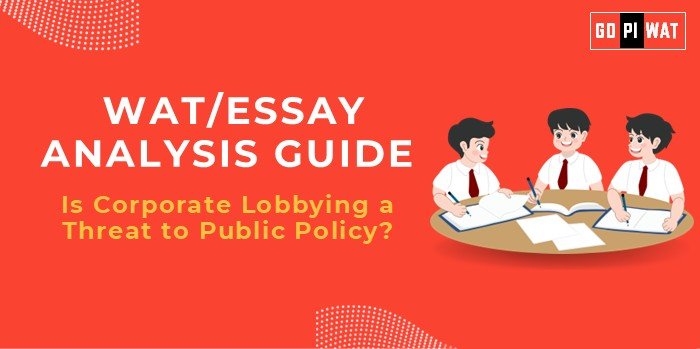📋 Written Ability Test (WAT)/Essay Analysis Guide
Topic: Is Corporate Lobbying a Threat to Public Policy?
🌟 Understanding the Topic’s Importance
Corporate lobbying plays a significant role in shaping public policy, especially in economies where regulatory frameworks are evolving. Its implications for governance, economic equity, and democratic integrity make it a critical subject for analysis in business education.
⏱️ Effective Planning and Writing
- Time Allocation:
- 📝 Planning: 5 minutes
- ✍️ Writing: 20 minutes
- 🔍 Review: 5 minutes
- Preparation Tips:
- Gather data on lobbying practices and their outcomes.
- Identify key stakeholders and ethical considerations.
- Develop a clear thesis statement and outline supporting arguments.
💡 Introduction Techniques for Essays
- Contrast Approach:
“While corporate lobbying has led to advancements in sectors like renewable energy, instances such as the Vedanta Sterlite controversy in India raise concerns about its impact on public policy and environmental standards.”
- Timeline Approach:
“From the early days of industrialization to the modern digital economy, corporate lobbying has evolved into a powerful tool for influencing public policy, prompting ongoing debates about its ethical implications.”
📊 Structuring the Essay Body
🏆 Achievements
- 💡 Policy Innovation: Lobbying by the renewable energy sector influenced the U.S. Renewable Fuel Standard, promoting alternative energy and reducing carbon emissions.
- 📈 Economic Contributions: In India, corporate advocacy for the Make in India initiative attracted $85 billion in FDI (2023), fostering job creation and industrial growth.
⚠️ Challenges
- 📉 Regulatory Capture: Big Pharma’s influence on healthcare policies sometimes prioritizes profits over affordable medicine.
- 🔍 Transparency Deficit: Limited public disclosure of lobbying expenditures, especially in emerging economies like India, undermines accountability.
🚀 Future Outlook
- 🌍 Global Best Practices: Scandinavian countries employ public lobbying registers and stricter accountability measures, serving as models for improving transparency.
- 📜 Recommendations: Incorporating compulsory lobbying disclosure systems and independent oversight can enhance trust in public policy frameworks.
📄 Concluding Effectively
- Balanced Conclusion:
“Corporate lobbying can bridge gaps between industry expertise and policymaking, yet its unchecked forms risk undermining public trust. Establishing robust frameworks for transparency and accountability will ensure lobbying serves the public interest.”
- Global Comparison Conclusion:
“India can learn from countries like Norway and Sweden, where stringent regulations and transparent practices balance corporate interests with public welfare, creating equitable policy frameworks.”
✍️ Sample Short Essays
- Balanced Perspective:
“Corporate lobbying, a double-edged sword in policymaking, has facilitated economic and policy innovations globally. However, its unchecked nature often jeopardizes public interest, necessitating robust transparency laws to ensure balanced outcomes.”
- Solution-Oriented Approach:
“Lobbying, if conducted ethically, can bridge expertise gaps in governance. Adopting Scandinavian models of transparency and regulation will empower governments to align corporate interests with societal needs.”
- Global Comparison Approach:
“India’s regulatory gaps in lobbying starkly contrast with Scandinavian best practices. By adopting similar transparency and oversight mechanisms, India can mitigate risks of corruption while harnessing lobbying for inclusive growth.”
🌟 Recommendations for Sustainable Progress
- 📜 Introduce Mandatory Disclosure Laws: All lobbying activities, expenditures, and outcomes should be publicly recorded and audited.
- 🤝 Strengthen Independent Oversight: Regulatory bodies should ensure lobbying aligns with public interest.
- 📢 Foster Stakeholder Awareness: Educating the public and media on the role and ethics of lobbying can build trust and transparency.
🌍 Global Context
- 🇳🇴 Norway and Sweden: High transparency and ethical lobbying practices set benchmarks for balancing corporate influence with public welfare.
- 🇺🇸 United States: Strong lobbying culture facilitates innovation but raises concerns about disproportionate corporate influence.


